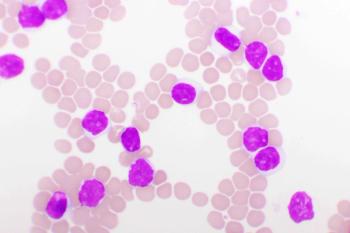
Providers
Latest News

Baricitinib Leads to Significant Hair Regrowth in Adolescents With Severe Alopecia Areata
Latest Videos
Podcasts
More News

Bariatric surgery halves mortality and reduces liver, heart, and kidney complications in steatotic liver disease vs nonsurgical care.

The study underscores the importance of repeat testing in cases where myelin oligodendrocyte glycoprotein immunoglobulin G tests are borderline.

Despite improved selectivity, real-world data point to persistent cardiovascular challenges even with next-generation BTKi therapies.

A recent study reveals a heightened stroke risk in asthma patients recovering from severe COVID-19, emphasizing the need for proactive monitoring and management.

Nicoletta Colombo, MD, PhD, of the University of Milan-Bicocca, discussed the rationale behind paclitaxel with bevacizumab and pembrolizumab in ovarian cancer.

There is a significant link between chronic spontaneous urticaria and cardiovascular disease risk, highlighting the need for routine assessments.

Experts discuss how topical therapies effectively manage atopic dermatitis in pediatric patients, enhancing outcomes and addressing unique challenges.

Hair loss disorder can lead to a significant psychological and emotional burden that warrants more attention, new research suggests.

Deuruxolitinib 8 mg BID was found to be the most effective oral JAK inhibitor for severe alopecia areata in a new meta-analysis.

Despite clinical definitions suggesting patients recover from exacerbations within 2 weeks of hospital discharge, most patients in a qualitative survey believed they had not achieved recovery within 3 months.

Combining ELR with CT-based measures predicts olfactory recovery in CRSwNP patients, highlighting eosinophils' role in disease severity and dysfunction.

Experts at AMCP Nexus 2025 highlighted how real-world data can improve CAR T-cell therapy access and outcomes.

Brigid Groves, PharmD, MS, discusses the importance of using trustworthy sources so that pharmacists can support communities with accurate information.

Metabolic intermediates were identified as active participants in fibrosis progression and potential targets for next-generation therapies.

Exploring Teclistamab’s Potential in Combination Therapy for Multiple Myeloma: Marc S. Raab, MD, PhD
Marc S. Raab, MD, PhD, discusses the different ways that combination therapy that includes teclistamab can benefit patients with multiple myeloma.

Real-world data suggest metabolic dysfunction-associated steatotic liver disease is also associated with higher all-cause mortality.

Previous research has evaluated PD-1/PD-L1 immunotherapy in patients with extensive-stage small cell lung cancer (ES-SCLC), but research in the setting of limited-stage disease is sparse.

Radiomic assessment has been used to distinguish multiple sclerosis from similar disorders, and it might also be useful in identifying MS stages and subtypes.

Overlapping metabolic mechanisms drive both chronic kidney disease (CKD) and valvular heart disease (VHD), a new review outlined.

Cardiac adverse events were lower among patients taking zanubrutinib compared with ibrutinib in the real-world setting.

Structural and microbial findings point to a potential nasal-brain immune connection in patients with multiple sclerosis (MS).

A multidisciplinary approach that includes addressing social determinants of health reduces time to remission despite higher initial costs.

Attorney General Ken Paxton claims the manufacturers marketed acetaminophen toward pregnant women despite the “known dangers” to unborn children.

Explore the future of cancer treatment with tumor-agnostic therapies, as experts unveil promising trials and innovative drug developments at ESMO.

Synovial sarcoma—a rare, aggressive soft tissue cancer—can present as a painless hand swelling that mimics a harmless lesion, underscoring the need for early recognition and improved diagnostic access in low-resource settings.






















